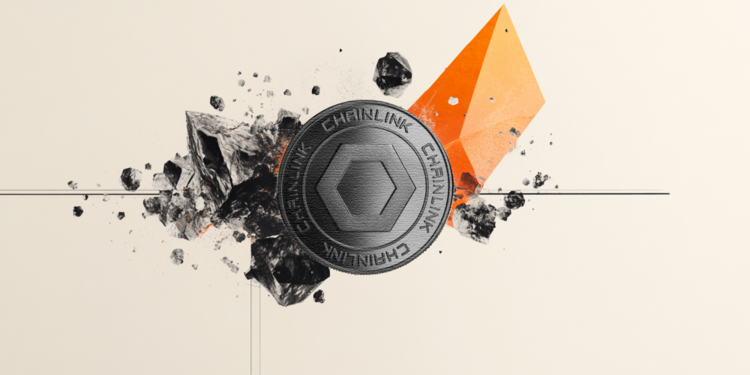Chainlink & Mastercard Partnership for On-Chain Crypto Purchases

The cryptocurrency world is witnessing a significant evolution with the announcement of a groundbreaking partnership between Chainlink and Mastercard. This collaboration is poised to transform how billions of Mastercard users interact with digital assets by enabling direct on-chain crypto purchases. This is not merely another integration but a monumental stride towards mainstream cryptocurrency adoption, bridging the gap between traditional finance (TradeFi) and the decentralized Web3 ecosystem.
The core vision of this partnership is to simplify the acquisition of cryptocurrencies, making it as straightforward as any online purchase directly from a bank account or credit card, with instant transfer to the blockchain. Historically, purchasing cryptocurrencies has often involved complex multi-step processes through third-party exchanges, raising concerns about custody. Chainlink, a leading decentralized oracle network, is central to this integration, providing the secure and reliable infrastructure necessary to connect real-world data and traditional payment systems to blockchain networks. Mastercard contributes its immense global network and user base, encompassing nearly 3 billion cardholders, to this synergy. The aim is to dramatically streamline the user experience, allowing individuals to acquire digital assets directly on a blockchain without navigating intricate exchange interfaces or worrying about off-chain custodial risks. This move signals a profound shift in Mastercard’s strategy, indicating its recognition of blockchain technology's inevitability and potential.
The essence of this partnership lies in enabling direct on-chain crypto purchases, meaning assets are immediately transferred to a blockchain address controlled by the user's wallet, ensuring direct custody and eliminating reliance on third-party exchanges. This process leverages Chainlink’s robust oracle services to secure and verify the connection between traditional payment rails and the blockchain, thereby minimizing risks related to data integrity and transaction execution. The streamlined experience means users can bypass depositing fiat into an exchange, converting it, and then withdrawing to a personal wallet; instead, they can buy crypto and have it delivered directly to their chosen on-chain address.
To facilitate this ambitious initiative, Chainlink and Mastercard have enlisted several key Web3 partners. ZeroHash provides the essential infrastructure for regulated fiat-to-crypto conversion. Shift4 Payments handles the processing of Mastercard transactions. Swapper Finance, in conjunction with XSwap, serves as the front-end application for crypto swaps, sourcing liquidity from decentralized exchanges like Uniswap, which will directly interface with the platform. This multi-faceted approach ensures that Mastercard users’ crypto transactions are routed efficiently through these specialized services for card processing, regulatory compliance, and final fiat-to-crypto conversion on-chain. This detailed mechanism contrasts sharply with typical centralized exchange methods, promising enhanced security and user control.
The scale of this collaboration has the potential to dramatically accelerate global cryptocurrency adoption. Mastercard’s extensive global reach brings crypto within the grasp of billions, addressing common hurdles such as complexity and limited accessibility. The endorsement and integration by a major financial institution like Mastercard also lend significant credibility to the digital asset space, potentially easing concerns for traditional investors and consumers. By simplifying the on-ramp process, the partnership removes a substantial barrier for new users, making it easier for them to engage with and embrace cryptocurrencies. Moreover, such high-profile collaborations signal to other financial institutions the growing necessity of engaging with blockchain and digital assets for future growth, positioning both Mastercard and Chainlink at the forefront of a financial revolution.
Beyond mere transactional convenience, this partnership represents a significant leap forward for Web3 innovation. Web3 envisions a decentralized internet where users maintain greater control over their data and digital assets, powered by blockchain technology. Chainlink's role as the secure middleware, providing reliable, tamper-proof data feeds for smart contracts to interact with real-world events and traditional systems, is crucial for bridging existing financial infrastructure with burgeoning decentralized applications (dApps). This seamless integration is expected to enhance DeFi access, fuel NFT market growth by simplifying crypto acquisition, and pave the way for entirely new types of decentralized applications that require real-world payment interactions. This initiative underscores the growing synergy between established corporations and cutting-edge blockchain protocols, demonstrating how Web3 technologies can be integrated into everyday life, potentially unlocking seamless digital asset payments for a global audience.
Despite the exciting prospects, implementing such a large-scale integration comes with inherent challenges. The evolving global regulatory landscape for cryptocurrencies necessitates careful navigation across different jurisdictions. Scalability is another critical factor, as blockchain networks must be robust enough to handle the immense transaction volume from billions of potential users. Furthermore, educating a broad user base about self-custody, blockchain security, and the nuances of digital assets remains vital. Technically, seamlessly integrating complex traditional payment systems with decentralized blockchain protocols is a significant undertaking. However, the commitment from both Chainlink and Mastercard suggests a long-term vision and a willingness to overcome these hurdles, leveraging their combined expertise.
The collaboration is a clear win for the broader crypto ecosystem. For Chainlink, it significantly enhances its utility, validates its position as an industry-standard oracle network, and could drive demand for its services and native token. For Mastercard, it solidifies its innovative stance in the financial sector, ensuring its relevance in the expanding digital economy and potentially attracting new generations of users. For individuals, it promises unprecedented ease of access to digital assets, fostering greater financial autonomy. For the crypto market, it could lead to increased liquidity, stability, and legitimacy, potentially attracting more institutional investment. Following the news, Chainlink’s LINK token experienced a notable price surge, with a rally of nearly 5% to 18% initially, stabilizing around $13.30-$13.33, demonstrating strong market optimism, despite the token not being directly involved in the partnership infrastructure itself. This also follows previous efforts by Mastercard in the crypto space, including partnerships with Bit2Me for debit cards, Fasset for adoption in Indonesia, Ripple for CBDCs, and Moonpay for stablecoin off-ramp payments.
In conclusion, the Chainlink Mastercard partnership marks a truly transformative moment for the cryptocurrency world. By enabling direct on-chain crypto purchases for billions of users, it fundamentally reshapes the landscape of cryptocurrency adoption. This strategic alliance represents a powerful fusion of traditional financial might and cutting-edge Web3 innovation, paving the way for seamless digital asset payments that could soon become commonplace. As the lines between traditional finance and decentralized technology continue to blur, this partnership stands as a beacon, guiding us towards a more accessible, integrated, and decentralized financial future.











